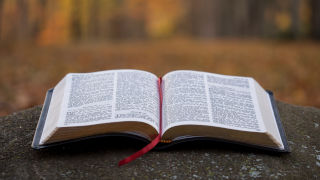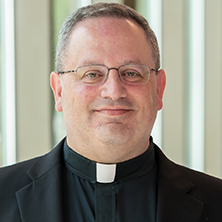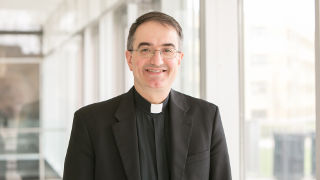Seminary Professors Contribute to New Testament Revision - Seton Hall University
Monday, February 15, 2021

Two of these exemplary individuals, Reverend Pablo Gadenz, S.S.L., S.T.D., Associate Professor of Biblical Studies, and Reverend Christopher Ciccarino, S.S.L., S.T.D., Associate Dean for Seminary and Academic Studies and Assistant Professor of Biblical Studies, are part of the group of scholars involved with revising the New Testament of the New American Bible, so that a single version may be used for individual prayer, catechesis and liturgy. According to Cardinal Donald W. Wuerl, the retired archbishop of Washington, D.C., the United States bishops' committees on Divine Worship and Doctrine had both expressed a desire for a single translation that would "provide us one source of language when we speak the Word of God."

Reverend Christopher Ciccarino, S.S.L., S.T.D.
Father Ciccarino has been involved with the project since 2012 as editor of the Pauline Literature working group. He and the editors of the Matthew-Mark, Luke-Acts, Johannine Literature and Catholic Epistles working groups began the revision process by meeting regularly with a contact from the United States Conference of Catholic Bishops (USCCB) to develop principles of translation that would guide the project. "The New American Bible is a ‘formal equivalence' translation, that is, one which tries to be as literal to the Greek as English permits," Father Ciccarino explains. After developing these principles in dialogue with the bishops, the editors each recruited individual translators for the project – Catholic and non-Catholic scholars including lay men and women, members of religious orders and priests.

Reverend Pablo Gadenz, S.S.L., S.T.D.
From 2013 to 2017, the group reviewed the existing translation of St. Paul's letters and proposed changes where necessary. Over the two years that followed, Father Ciccarino and his peer editors carefully reviewed each suggested change; in March of 2019, they submitted the changes to the USCCB Subcommittee for the Translation of Scripture Text, who have been reviewing the work ever since.
Father Gadenz is one of several consultants to this subcommittee – a position he has held since 2015. "The task of the subcommittee is to review the proposed revision, one book of the New Testament at a time, making suggestions for changes and corrections to the editorial board," explains Father Gadenz. "Eventually, when this work is completed, the proposed revision will be given to the whole body of U.S. bishops for approval."
Once it is approved by the bishops, the translation will go to the Vatican for review and final approval, at which point it will serve Catholics as the readings for Mass, in private study and prayer, and in the Liturgy of the Hours. The Catholic Biblical Association anticipates that the new version of the New American Bible will be ready by 2025.
Fathers Gadenz and Ciccarino join a long tradition in the promotion of Scripture to Catholics. Former Seton Hall University president, Bishop John Dougherty, S.S.D., assisted with the translation of the Confraternity edition of the Bible, the first modern edition for American Catholics in the 20th century.
"The current version of the New Testament in the New American Bible dates back to 1986, so it has been more than 30 years since the last revision, and some of the principles of translation have changed since then," says Father Gadenz. "Moreover, besides the revised translation, all the notes in the New Testament are being revised so that they are more helpful to general readers of the New American Bible."
"I am excited to be a part of this project, which will have a direct impact on the experience of Catholics around the country who will hear the new version proclaimed at Mass," he continues. "The project is one of the many ways that the faculty of ICSST serve the wider Church community."
Indeed, when Catholics all over the nation begin to incorporate this new translation into their prayer, ICSST students will be able to proudly say that two of their own professors helped make it possible.
Categories: Faith and Service






